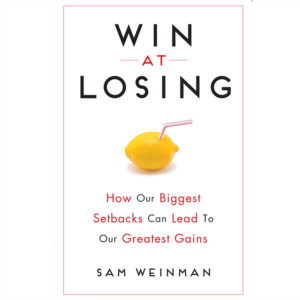 It’s a given… When you play a sport, at some point you will win, and at some point you will lose. While winning is a great feeling, it’s often hard for kids to experience The Loss. Yet, learning out to navigate a loss is a necessary life lesson.
It’s a given… When you play a sport, at some point you will win, and at some point you will lose. While winning is a great feeling, it’s often hard for kids to experience The Loss. Yet, learning out to navigate a loss is a necessary life lesson.
 Recently, I invited author, Sam Weinman, who wrote, Win at Losing: How Our Biggest Setbacks Can Lead To Our Greatest Gains to talk about this important lesson.
Recently, I invited author, Sam Weinman, who wrote, Win at Losing: How Our Biggest Setbacks Can Lead To Our Greatest Gains to talk about this important lesson.
Together we discussed what led Sam on the journey to write about losing. Sam described growing up playing sports like ice hockey, baseball, tennis and soccer. Ice hockey was a favorite. He plays in an adult league and coaches his two sons. Sam also enjoys golf and is a sports journalist in the golf industry.
Sam said, “It’s always been interesting and fascinating sort of other side to discover. I just feel like people are really interesting in those moments when they talk about losing, why they lost, what it means and all of that.”
He said, “As an athlete, myself, and as a dad, I just feel like it is such a huge part of growing up. Learning to persist is learning to deal with losing and trying to take some type of meaning away from it.”
Learning From A Painful Loss
A loss, whether as an individual athlete or as a team can be painful, but it can also be a learning experience. Sam mentioned when one loses, he or she has a choice: sulk or figure out what to do next. It’s always better when an athlete can gain something from a loss rather than wallow in pity. Within every loss is a great opportunity to grow.
In my experience as a coach, one of the biggest hurdles was exactly what Sam describes: our biggest setbacks CAN (not will) lead to the greatest gains. It all depends on how an athlete deals with the loss. If he considers it as an opportunity for growth, often the next competition will reflect it.
Some of the biggest wins come right after failure. The “long view”, as Weinman puts it, is important. Looking past the failure to find the positives and learning from the experience to perform better in the future.
The Power of Being Positive
When an athlete focuses on staying positive in the tough times (not necessarily “happy”, just positive), he gains mental strength. That strength will endure over time which will also help avoid burnout. In addition, having balance and showing restraint (you can’t do EVERYTHING) will also help reduce fatigue.
Kids get wrapped up in one sport. If they don’t enjoy it, they won’t excel. You’ll sometimes see kids playing merely because their parents want them to. But for success to happen, kids have to want it for themselves. A coach and parent will need to know what will keep them excited about their sport. Often times, it’s just changing practices to include more games to make it FUN!
In his book, Sam has a collection of stories and examples related to winning, losing, and how different people deal with that challenge. You can find his book for sale online at his website: http://www.SamWeinman.com or on Amazon.com.
This is just a small sample of the insights that Sam shared with me. The entire interview is hosted in the Youth Athlete Academy.
About Sam Weinman:

Sam’s book WIN AT LOSING, took root when his sons struggled with losing.Sam has been the Digital Editor for Golf Digest since 2009. Prior to 2009 Sam covered golf and the NHL for The Journal News in Westchester, New York, and wrote for publications that included Golf Digest, USA Today, Golf World, Yahoo! Sports, ESPN the Magazine, and Sports Illustrated. He’s been honored with multiple first place awards in the Associated Press Sports Editors and Golf Writers Association of America writing contests.
